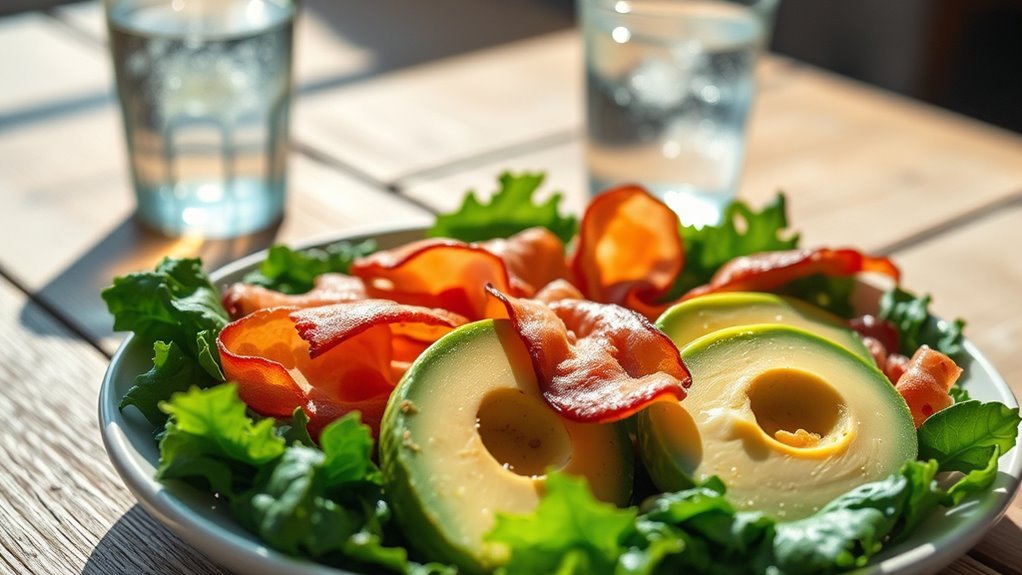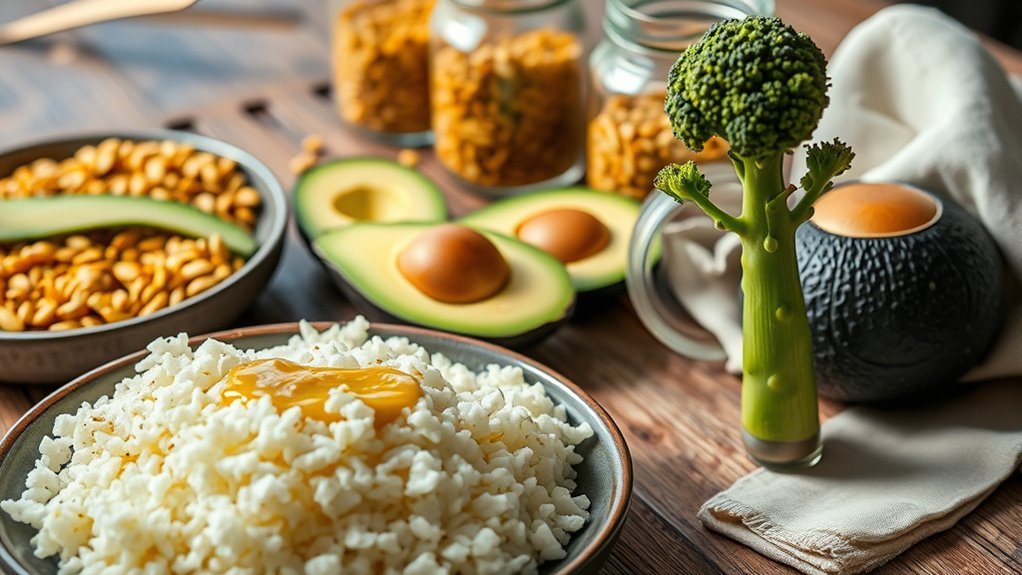Yes, the keto diet can make you gassy due to its high-fat content and low carbohydrate intake. As your body adapts to ketosis, digestive changes can lead to gas and bloating. Foods high in fiber, sugar alcohols, and dairy may also contribute to discomfort. It’s essential to gradually increase fiber, monitor your food choices, and stay hydrated to aid digestion. Understanding these factors will help you manage gas issues and enjoy a smoother keto experience.
Understanding the Keto Diet

When you explore the keto diet, it’s important to understand its foundation: a high-fat, low-carbohydrate eating plan designed to shift your body into a state of ketosis. The keto basics involve drastically reducing your carb intake while increasing healthy fats, which can help your body burn fat for fuel. Dietary guidelines typically suggest consuming about 70-75% of your calories from fats, 20% from protein, and only 5-10% from carbohydrates. This shift can lead to numerous health benefits, such as weight loss and improved mental clarity. It’s essential to focus on whole, nutrient-dense foods while adhering to these ratios to maximize your results. Embracing these principles will empower you to take control of your health and experience the freedom that comes with a well-structured diet.
Common Digestive Issues on Keto

While shifting to a keto diet can offer significant benefits, it may also bring about various digestive issues for some individuals. Many people experience symptoms like bloating, constipation, or diarrhea, often fueled by keto myths that suggest drastic dietary changes are easy for everyone. When you reduce carbohydrate intake, your body may lack the digestive enzymes necessary to break down fats and proteins effectively, leading to discomfort. Additionally, the sudden increase in fat consumption can overwhelm your digestive system, causing further distress. To mitigate these issues, consider gradually integrating keto foods and ensuring adequate hydration. Understanding your body’s responses can help you navigate the change more smoothly and maintain the freedom you seek with the keto lifestyle.
Why Does Keto Cause Gas?

As you shift to a keto diet, gas can become a common issue due to several factors associated with this low-carb lifestyle. To begin with, during keto adaptation, your body undergoes significant metabolic changes, which can affect digestion. As you reduce carbs, your intake of fiber may also decrease, impacting gut health and leading to gas. Additionally, your digestive enzymes may take time to adjust to the higher fat intake typical of keto. This adjustment can slow down digestion, resulting in fermentation and gas production. Finally, the introduction of new foods or ingredients, like sugar alcohols, can contribute to bloating and discomfort. Understanding these factors can help you navigate your keto journey more effectively and embrace the freedom it offers.
Foods That May Contribute to Gas
Certain foods can greatly contribute to gas while you’re on a keto diet. High-fiber vegetables, dairy products, and sugar alcohols are common culprits that may lead to discomfort. It’s crucial to be mindful of these items in your diet to manage gas effectively.
High-Fiber Vegetables
Incorporating high-fiber vegetables into your keto diet can be a double-edged sword; while they offer essential nutrients and promote digestive health, they may also lead to increased gas production. To enjoy the high fiber benefits without excessive gas, consider these vegetable choices:
- Broccoli – Rich in vitamins and fiber, but can cause gas in some.
- Cauliflower – A great low-carb option, though it may ferment in the gut.
- Brussels Sprouts – Nutrient-dense, yet notorious for gas production.
- Kale – Packed with nutrients, but can be tough on digestion for some.
Balancing your intake and introducing these vegetables gradually can help minimize discomfort while still reaping their health benefits.
Dairy Products
While high-fiber vegetables can enhance your keto diet, dairy products often present their own challenges, particularly when it comes to gas production. Many people struggle with lactose, the sugar found in milk, which can lead to bloating and discomfort. If you’re sensitive to lactose, consider opting for lactose-free options like hard cheeses or Greek yogurt, which contain lower levels of lactose. Additionally, dairy alternatives such as almond milk, coconut yogurt, and cashew cheese can provide your favorite flavors without the potential gas issues. By choosing these alternatives, you can maintain your keto lifestyle while minimizing gastrointestinal discomfort, allowing you to enjoy the freedom that comes with a well-balanced diet.
Sugar Alcohols
Sugar alcohols, often used as low-calorie sweeteners in keto-friendly products, can be a double-edged sword when it comes to digestion. While they help satisfy your sweet tooth without spiking blood sugar, their sugar alcohols effects can lead to unwanted gas and bloating for some.
Here are four key points to take into account:
- Low Digestibility: Your body doesn’t fully absorb sugar alcohols, leading to fermentation in the gut.
- Individual Tolerance: Everyone’s digestive health varies; some may tolerate them better than others.
- Common Varieties: Sorbitol, mannitol, and xylitol are frequent culprits in keto snacks.
- Moderation Is Key: Limiting intake may help mitigate gas and bloating while enjoying keto-friendly treats.
The Role of Fiber in a Keto Diet
When following a keto diet, it’s vital to take into account fiber sources, as they play an essential role in maintaining digestive health. Low-carb options like leafy greens, avocados, and nuts can help you meet your fiber needs while staying within your carb limits. Understanding the right types of fiber can greatly impact your overall well-being on this diet.
Fiber Sources on Keto
Although many people associate the ketogenic diet primarily with high-fat and low-carb foods, it’s vital to take into account the role of fiber, which can greatly impact your digestive health and overall well-being. Incorporating keto friendly fibers is essential for maintaining balance. Here are some excellent sources of fiber on a keto diet:
- Avocados – Packed with healthy fats and fiber.
- Chia Seeds – High in omega-3s and fiber, perfect for recipes.
- Flaxseeds – Great for adding to smoothies or baked goods.
- Leafy Greens – Spinach and kale provide fiber along with essential nutrients.
Impact on Digestive Health
While many focus on the macronutrient ratios of a ketogenic diet, it’s essential to recognize that the role of fiber greatly influences your digestive health. Adequate fiber intake can enhance keto digestion and promote gas reduction, helping you feel more comfortable. Here’s a quick look at fiber sources and their benefits:
| Fiber Source | Benefits |
|---|---|
| Avocado | High in fiber and healthy fats |
| Chia Seeds | Packed with omega-3s and fiber |
| Spinach | Low-carb, nutrient-dense option |
| Flaxseeds | Supports gut health and digestion |
Incorporating these fiber-rich foods into your keto diet can improve overall digestive function, reducing discomfort and enhancing your experience on this low-carb journey.
Lactose Intolerance and Keto
If you’re following a ketogenic diet and struggle with lactose intolerance, maneuvering your food choices can be challenging. However, you can still enjoy the benefits of a keto lifestyle by opting for lactose-free alternatives. Here are some keto-friendly dairy options to evaluate:
- Coconut milk yogurt – A delicious and creamy alternative with low carbs.
- Almond milk cheese – A versatile cheese substitute that fits well in many recipes.
- Lactose-free cream cheese – Perfect for dips or spreads without the discomfort.
- Cashew cream – A rich, dairy-free option for sauces or soups.
Managing Gas and Bloating on Keto
If you’re experiencing gas and bloating on a ketogenic diet, understanding the common causes is essential for finding relief. Dietary adjustments, such as reducing fiber-rich foods and incorporating probiotics, can greatly improve gut health and minimize discomfort. By making these changes, you can enjoy the benefits of keto without the unpleasant side effects.
Common Causes of Gas
Gas and bloating can be common challenges when starting a ketogenic diet, as your body adjusts to a significant shift in its macronutrient intake. Understanding the common causes of gas can help you with effective gas management. Here are four possible culprits:
- Increased Fiber: A sudden rise in fiber intake from low-carb vegetables can lead to gas production.
- Dairy Products: Some people may struggle with lactose intolerance, resulting in bloating when consuming dairy.
- Sugar Alcohols: Often found in keto-friendly snacks, these can ferment in the gut and cause gas.
- Digestive Enzymes: Your body may need time to adapt, and insufficient digestive enzymes can hinder proper food breakdown.
Dietary Adjustments for Relief
Adjusting to a ketogenic diet can lead to digestive discomfort, but there are dietary adjustments you can make to alleviate gas and bloating. First, consider gradually increasing your fiber intake from low-carb vegetables, allowing your digestive system to adapt without overwhelming it. You might also want to monitor your intake of sugar alcohols, as they can contribute to gas. Staying hydrated helps too, as water aids digestion and can reduce bloating. Incorporating healthy fats, like avocados and olive oil, can provide gas relief while keeping you satisfied. Finally, eating smaller, more frequent meals may help your body digest food more efficiently, minimizing discomfort. Remember, finding what works for you is essential in achieving a comfortable keto experience.
Probiotics and Gut Health
While shifting to a ketogenic diet, incorporating probiotics can greatly enhance gut health and help manage gas and bloating. Probiotics support a balanced gut microbiome, which is essential for digestion and nutrient absorption. To optimize your gut health on keto, consider these probiotic sources:
- Fermented Foods: Foods like kimchi, sauerkraut, and yogurt can introduce beneficial bacteria.
- Probiotic Supplements: Look for high-quality supplements containing diverse strains.
- Kefir: This fermented dairy drink is rich in probiotics and easy to digest.
- Bone Broth: While not a traditional probiotic, it supports gut lining integrity and overall health.
Tips for Reducing Digestive Discomfort
To minimize digestive discomfort on a ketogenic diet, it’s vital to focus on gradual changes and mindful eating habits. Start your keto meal prep with familiar foods, slowly incorporating new ingredients to give your digestive system time to adjust. Choose high-quality fats and fiber-rich vegetables to support gut health and enhance digestion. Don’t forget to take into account digestive enzymes; they can help break down food more efficiently, reducing gas and bloating. Staying hydrated is imperative, as water aids digestion and helps prevent constipation. Finally, pay attention to portion sizes; eating smaller meals can ease digestive strain. By being intentional with your food choices and habits, you can enjoy the benefits of keto while minimizing discomfort.
When to Seek Medical Advice
It’s important to recognize when digestive issues on a ketogenic diet may signal a need for medical advice. If you experience persistent gas symptoms or discomfort, consider seeking a medical evaluation if:
- Symptoms last longer than a week – Ongoing discomfort may indicate an underlying issue.
- You notice significant changes in bowel habits – Diarrhea or constipation that doesn’t resolve could be problematic.
- You experience severe abdominal pain – Intense pain may be a sign of a more serious condition.
- You have unexplained weight loss – This could indicate a malabsorption issue or other health concern.
Listening to your body is essential. If something feels off, don’t hesitate to consult a healthcare professional for guidance and support.
Enjoying the Benefits of Keto Without the Gas
Adopting a ketogenic diet can offer numerous health benefits, but many people struggle with gas and digestive discomfort. To enjoy the benefits of keto without the gas, focus on effective keto meal planning and consider digestive enzyme supplementation. Here’s a quick guide:
| Tips | Benefits |
|---|---|
| Plan balanced meals | Reduces gas from unbalanced intake |
| Include fiber-rich low-carb veggies | Supports digestion |
| Stay hydrated | Aids in digestion |
| Use digestive enzymes | Enhances nutrient absorption |
| Monitor food triggers | Identifies personal sensitivities |
Frequently Asked Questions
Can Switching to Keto Suddenly Cause Increased Gas Production?
Yes, switching to keto can suddenly cause increased gas production. This often happens due to changes in keto digestion and a shift in dietary fiber intake. When you reduce carbs, you might consume more fiber from non-starchy vegetables or nuts, which can lead to gas as your body adapts. It’s crucial to introduce these foods gradually to help your digestive system adjust and minimize discomfort while enjoying the freedom of a keto lifestyle.
Are There Specific Keto-Friendly Foods That Reduce Gas?
Certain keto-friendly foods can indeed help reduce gas. For instance, a study found that low-FODMAP diets can lower gas production by up to 70%. Incorporating fiber sources like spinach, zucchini, and avocados can promote better digestion. You’ll also benefit from digestion tips like chewing your food thoroughly and staying hydrated. These strategies not only enhance your keto journey but also help you feel more comfortable as you make dietary adjustments.
How Long Does Gas Last on a Keto Diet?
Gas duration on a keto diet can vary. Typically, you might experience increased gas for a few days to a couple of weeks as your body makes digestive adjustments to the higher fat intake and lower carb levels. This change can lead to temporary discomfort, but it often subsides as your gut adapts. If gas persists beyond two weeks, consider evaluating your food choices for potential triggers that could be impacting your digestion.
Is Gas a Sign of Keto Adaptation?
Gas can indeed be a sign of keto adaptation for many people. Studies show that about 25% of individuals on a ketogenic diet experience digestive changes as their bodies adjust to fat as the primary fuel source. While this adaptation can cause temporary discomfort, it’s generally a normal part of improving your digestive health. As your body becomes more efficient at burning fat, these symptoms often subside, leaving you feeling more liberated and energized.
Can Probiotics Help With Gas on a Keto Diet?
Yes, probiotics can help with gas on a keto diet. Certain probiotic strains, like Lactobacillus and Bifidobacterium, support digestive health by balancing gut bacteria. This balance can reduce gas and bloating, common concerns when adjusting to a keto lifestyle. Incorporating fermented foods or high-quality probiotic supplements may enhance your gut health, leading to a more comfortable experience on your journey. It’s all about finding what works best for your body.
Frequently Asked Questions
1. Does the ketogenic diet cause gas?
Yes, the ketogenic diet can cause gas in some individuals. This can be attributed to the significant changes in diet, particularly the increase in fat intake and the reduction of carbohydrates, which can disrupt normal gut bacteria and digestion. As your body adjusts to ketosis, it may produce more gas as it breaks down fats and fiber from low-carb vegetables.
2. Why does keto make some people more gassy than others?
Individual responses to the ketogenic diet vary. Factors such as gut microbiome composition, the types of foods consumed, and individual food intolerances can influence gas production. Some people may be more sensitive to certain foods high in fat or fiber, leading to more gas, while others may adapt without issues.
3. What can I do to reduce gas while on a keto diet?
To reduce gas on a keto diet, consider the following tips: gradually introduce high-fiber foods, chew food thoroughly, stay hydrated, and monitor food intolerances. Additionally, incorporating probiotics may help balance gut bacteria, potentially reducing gas production over time.
4. Are there specific foods that cause more gas on a keto diet?
Certain foods are known to cause more gas, including high-fiber vegetables (like broccoli and cauliflower), dairy products (if lactose intolerant), and artificial sweeteners (such as sugar alcohols). It’s advisable to monitor your body’s response to different foods and adjust your diet accordingly.
5. Is gas a sign that the keto diet is working?
Gas is not necessarily an indicator of the ketogenic diet’s effectiveness. It is more of a side effect of dietary changes and may indicate shifts in digestion and gut health. However, persistent or severe gas may warrant a review of your diet and should be discussed with a healthcare professional.
References
- https://www.ncbi.nlm.nih.gov/pmc/articles/PMC7073681/
- https://www.healthline.com/nutrition/keto-diet-and-gas
- https://www.medicalnewstoday.com/articles/325870
- https://www.webmd.com/diet/ss/slideshow-keto-diet
- https://www.clevelandclinic.org/health/diet-nutrition/what-is-the-keto-diet
- https://www.hopkinsmedicine.org/health/wellness-and-prevention/the-ketogenic-diet-what-you-need-to-know


